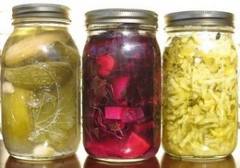“Scientists and doctors today are mystified by the proliferation of new viruses–not only the deadly AIDS virus but the whole gamut of human viruses that seem to be associated with everything from chronic fatigue to cancer and arthritis. They are equally mystified by recent increases in the incidence of intestinal parasites and pathogenic yeasts, even among those whose sanitary practices are faultless. Could it be that in abandoning the ancient practice of lacto-fermentation and in our insistence on a diet in which everything has been pasteurized, we have compromised the health of our intestinal flora and made ourselves vulnerable to legions of pathogenic microorganisms? If so, the cure for these diseases will be found not in vaccinations, drugs or antibiotics but in a restored partnership with the many varieties of lactobacilli, our symbionts of the microscopic world.” – Sally Fallon
Not so long ago, fermented foods were quite prevalent in our diet – sauerkraut, chutney, pickles, yogurt, kefir, and so on. You might be thinking, “What do you mean they WERE prevalent?… I eat those foods!” Unfortunately, these days we’ve traded quality for convenience and these food items are no longer truly fermented. Sauerkraut, chutney, and pickles are made with vinegar (resulting in a more acidic, less beneficial product) rather than fermented by traditional methods using salt or starter cultures. Kefir and yogurt are now pasteurized, killing off all the good bacteria that are crucial for our health on many levels, especially digestion. The excessive use of antibiotics by our health care system, as well as the meat and dairy industries, only adds further insult to injury, leading to poorer digestive function and poorer health in general. It’s time we change this!
A healthy immune system hinges on a healthy gut, as 80% of our immune system resides there. A healthy gut means healthy digestion and absorption of nutrients from our foods. We need a balance of LIVE, beneficial bacteria to do this. Therefore we MUST re-integrate fermented foods back into our diets.
Fermented foods:
- are rich in enzymes and produce antibiotic and anticarinogenic substances
- improve digestion
- increase energy
- promote health
- increase the availability of the nutrients in the foods you consume while also assisting in the absorption of these nutrients
- help restore proper balance of bacteria in gut
- promote regular elimination
- help reduce sugar cravings
February Health Challenge: Introduce and consume at least one new cultured/fermented food once a day!
How to integrate fermented foods into your daily routine:
Start by incorporating fermented vegetables into one meal a day, starting with a tablespoon at a time, or even a tablespoon of liquid, until you’re taste buds and tummy adjust. Then increase that to one serving at each meal. Slowly increase this amount until you’ve reached a 1/2 cup of cultured vegetables at each meal (or 2 oz. liquid) per day and possibly even as between-meal snacks.
If you feel gassy or bloated, rest assured that this is completely normal. Your gut is beginning to find its internal balance. This is a symptom of “die off” as the “bad guys” die and leave your body. Keep your portions small and persevere through it.
How to make your own fermented foods:
Weston A Price Foundation has a great article on LactoFermentation, laying out step-by-step instructions on how to create quality ferments.
Wholesome Goodness has an online tutorial for making fermented vegetables, with step-by-step photos utilizing a culture starter from Body Ecology
Nourished Kitchen has a phenomenal online course in fermentation (you can even learn how to make fermented ketchup and fermented french fries). Head over there now for a special discount through February 19th. Enter Coupon Code SOURPICKLES at checkout for $20 off.
Two sides of the spectrum: Lacto-ferment or Salt…
By The Whey Side – Why I’ve Stopped Using Whey In My Vegetable Ferments – Delicious Obsessions
Why You Should Consider Not Using Salt to Ferment Your Foods – Body Ecology
Below, are some additional online resources for you to explore as you continue along this journey toward optimal health.
Online Resources:
Cultures for Health – a wide selection of starter cultures and supplies
Fruit of the Vine – Organically grown cultures
Body Ecology – Donna Gate’s is a wealth of knowledge and has countless fermented products and starter kits available. Check out her book The Body Ecology Diet.
Wild Fermentation – great resource for all things fermented and check out Sandor Ellix Katz’s book Wild Fermentation
Weston A Price Foundation – focused on a traditional diet, this site has everything you need to support you in moving toward a more wholesome nutritious way of living. And check out Sally Fallon’s book Nourishing Traditions, as well as her interviews – Eat Fat, Lose Fat and Ask Sally Fallon over at Underground Wellness Radio








Pingback: 13 Tips For Winter Wellness | two sisters gluten free
Reblogged this on Kmareka.com and commented:
Adding to the to-do list: learn how to make fermented vegetables.